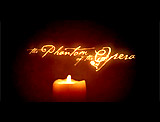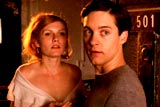
|
Film Kisses of All Time in Cinematic History 2004 |
![]()
![]()
![]()
![]()
![]()
![]()
![]()
![]()
![]()
![]()
![]()
![]()
![]()
![]()
| Film Title/Year and Description of Kiss in Movie Scene | ||

|
Facing Windows (2004, It.) (La Finestra di Fronte, 2003)
This heart-tugging Italian tale from Istanbul-born director Ferzan Ozpetek featured the tagline: "Desire Knows No Bounds." It told of an illicit yet loving relationship that developed between two neighbors who lived across the block from each other:
He was seen in a facing window every night from her kitchen window, where they secretly and passionately lusted after each other. Her fantasy-longings for a forbidden affair with the young banker were closely paralleled to the doomed affair between gay Jewish lovers in 1943 Europe, recounted by her amnesiac, elderly Holocaust survivor-houseguest Davide Veroli (Massimo Girotti) for his lost lover Simone (Ivan Bacchi) that he tragically chose to sacrifice. Sitting together on a park bench, Lorenzo told Giovanna how he was reluctantly being transferred in a few days to the Ischia branch of his bank:
She interrupted his halting words with a long kiss. Later after more flirtations, she shared much more passionate, voracious kisses with Lorenzo on the floor of his candle-lit apartment across from hers, as he told her:
After their kisses, she peered back through the window at her family across the way and felt conflicted. He asked her as he hugged her from behind:
And then she left his apartment without a word. Davide's words stirred Giovanna's emotions further when he advised her: "Don't be content to merely survive. You must demand to live in a better world, not just dream about it." Giovanna told her husband that she was going to resign her job ("This was my choice") to work in a pastry shop instead. As Lorenzo packed to leave, she delayed in coming down from her kitchen to the street to say goodbye and could only watch as his van turned the corner away from her. By film's end, in voice-over, she spoke to Davide in a letter:
There was an intense close-up of Giovanna's eyes underneath the credits - signifying that she had chosen to give up on her fantasy of finding love elsewhere. |
  
|

|
50 First Dates (2004)
Director Peter Segal's sweet romantic comedy (originally titled "50 First Kisses"), a variation on Groundhog Day (1993) and Memento (2000), told about a non-committal, womanizing veterinarian who took advantage of female tourists to Hawaii, until he was smitten by one young beautiful woman:
When he happened to meet her at waterfront Hukilau Cafe, he broke his long-standing rule about not dating local girls and instantly fell in love. At breakfast the next morning, she had no recollection of their previous meeting. [The film's premise was that she suffered from a form of amnesia that caused her short-term memory to be erased each day; in other words, each day kept repeating itself in her mind.] Therefore, Henry had to devise clever ways to re-meet Lucy every day (because she forgot him every night) and repeatedly renew his love for her. She was a perfect match for him - he could seduce and leave her repeatedly, and she'd never know. In a series of kissing scenes, he was smooching with her in front of spectacular backdrops, and hearing her say the same words back to him:
|
    
|

|
Head in the Clouds (2004)
Writer-director John Duigan's WWII melodrama - a romantic (and erotic) melodrama set in 1930s England, Paris, and Spain (during its civil war), told about a trio of young lovers sharing a Parisian apartment, highlighting sacrifices made to fight fascism and their decades-long love affair:
The film included:
|
 
|

|
The Notebook (2004)
This old-fashioned, sentimental story of separation and return followed the unfolding, star-crossed relationship between two young people, from the 1940s to decades later:
The film's twist (although fairly obvious after awhile) was that the elderly Noah was a devoted North Carolina nursing home resident/husband reading from a well-worn notebook (to recount their improbable romance and help stir up memories) to his Alzheimer's suffering wife (Allie). The film was filled with kisses, including the most memorable one:
She learned for the first time that he had written her 365 love letters (one each day for a year) - although her domineering mother had intercepted them. Noah professed on the dock: "It wasn't over. It still isn't over!" and they passionately embraced and kissed. Later as an elderly couple, they shared a second kiss and short remembrance of their love during a special candlelight dinner in the nursing home when they danced together - and Allie requested: "Do you think I can be her tonight?" |
 
|

|
(Andrew Lloyd Webber's) The Phantom of the Opera (2004)
Director Joel Schumacher's lavish costume drama adaptation of Andrew Lloyd Webber's 1986 Broadway musical told about a gifted young singer and her association with a legendary composer:
Christine maintained a dark attraction for the Phantom, and finally affectionately and self-sacrificially kissed him in his lair under the Paris Opera, in order to save dashing former childhood sweetheart Raoul Vicomte de Chagny (Patrick Wilson), who had been snared in a Punjab Lasso. Stunned by the kiss and touched by Christine's kindness, the Phantom set both Christine and Raoul free. |
 
|

|
In the film's conclusion, Peter Parker's (Tobey Maguire) long-time best friend Mary Jane Watson (Kirsten Dunst) left her marriage ceremony and found him in his apartment. Already knowing that he was Spider-Man from the previous scene when he had been unmasked saving her from Doctor Octavius (Alfred Molina), she knew that he loved her, but also realized that he wanted her to avoid risking her life by being with him:
She explained, however, that she had to be with him:
He thanked her and they kissed vigorously, although they were predictably interrupted by police sirens as he realized he had to respond to the emergency as the superhero. She encouraged him: "Go get them, tiger" and watched from his balcony as he swung into action. |
  
|
(in chronological order by film title) Introduction | 1896-1925 | 1926-1927 | 1928-1932 | 1933-1936 | 1937-1939 | 1940-1941 1942-1943 | 1944-1946 | 1947-1951 | 1952-1954 | 1955 - 1 | 1955 - 2 | 1956-1958 | 1959-1961 1962-1965 | 1966-1968 | 1969-1971 | 1972-1976 | 1977-1981 | 1982 1983-1984 | 1985-1986 | 1987 | 1988 | 1989-1990 | 1991 | 1992-1993 | 1994 1995 | 1996 | 1997 | 1998 | 1999 | 2000 | 2001 | 2002 | 2003 | 2004 | 2005 | 2006-2007 | 2008 | 2009- |